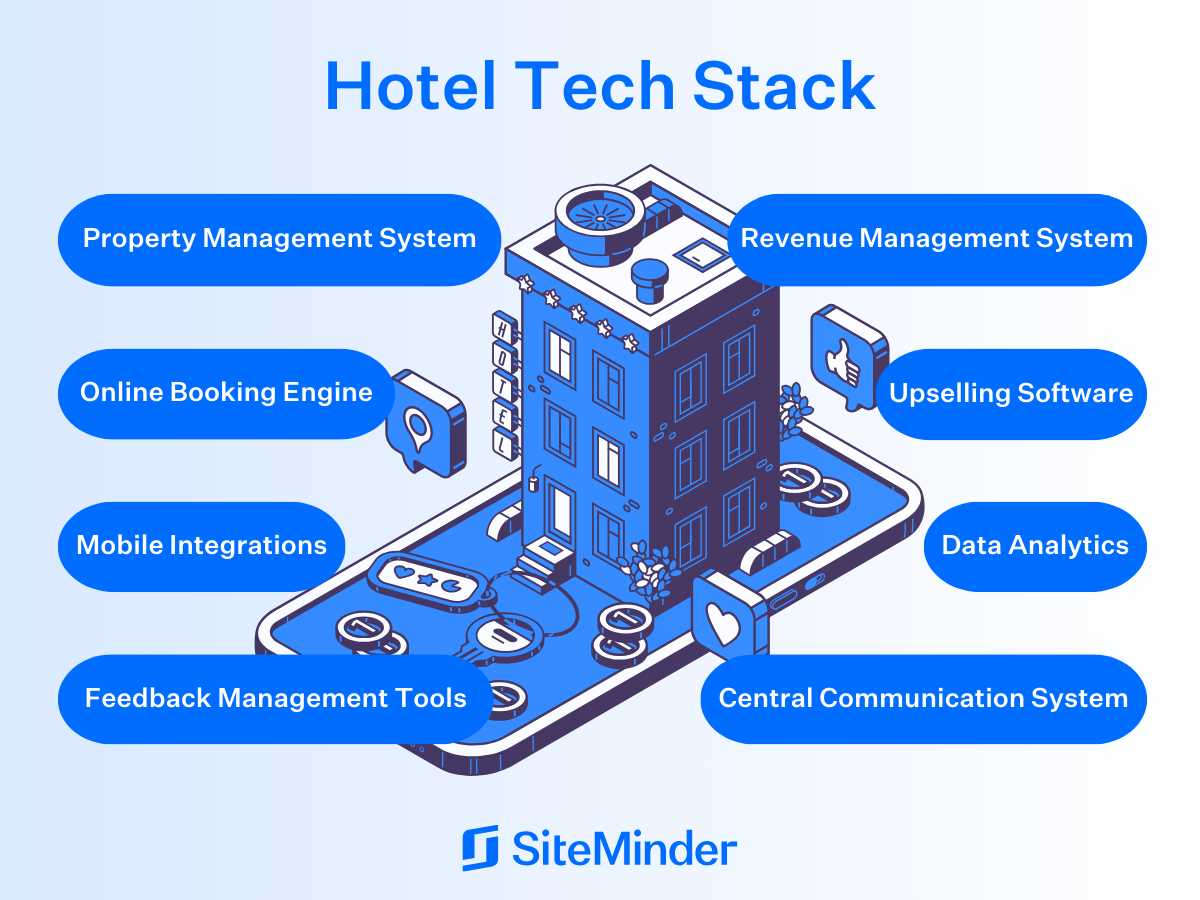What is a hotel tech stack?
A hotel tech stack is a combination of software tools used by hoteliers to manage and streamline operations, to enhance the guest experience, and to generate and optimise revenue.
The hospitality industry was one of the earliest adopters of digital technologies, and has remained at the leading edge of innovation ever since. Technology now forms the foundation upon which any successful hotel is built.
As such, digital tools and systems have a significant impact on the future prospects of a hotel. Build an effective, productive and powerful tech stack, and you set yourself up for success.
In this guide, we’ll take a closer look at hotel tech stacks, how to effectively build and scale yours, and why SiteMinder offers the best tech stack for hotels to boost their revenue.
Table of contents
How is a hotel tech stack interconnected?
What defines a hotel tech stack? Interconnectivity.
The best hotel tech stacks feature seamless integrations between various software solutions like your property management system (PMS), booking system, payment processor, channel manager and customer relationship management (CRM) system.
But why do all these tools need to be interconnected in the first place?
Why is it important to build a modern hotel tech stack?
Modern hotel tech stacks need to be interconnected – or ‘integrated’ – because this allows data to flow smoothly between all of the different tools in the stack, allowing them to talk to one another.
Integrated solutions open up endless opportunities for hotel automation. They take the human intermediary out of the equation, saving you vast amounts of time, reducing instances of human error, and generating data-driven insights that you and your team would’ve never otherwise discovered.
Optimise your tech stack and boost revenue
See how your hotel can meet, and even exceed, its revenue goals with the help of our smart platform, proven to increase RevPAR by 30%
Watch demo
Common mistakes when building your hotel tech stack
Hotels attempting to build or refine their tech stack face plenty of challenges. It can be an overwhelming process, and mistakes can be made. A few key hazards to avoid include:
- Choosing the wrong vendor or solution: Don’t rush tech stack decisions. Do thorough research to ensure a solution does what you need it to, will integrate seamlessly, is capable of scaling with your business, and doesn’t lock you in.
- Trying to fix square pegs into round holes: Integration is paramount. While you might prefer the look and feel of an incompatible solution, you should always prioritise interoperability.
- Confusing nice-to-haves with must-haves: Before shopping for solutions, you should spend time identifying the features that are absolute non-negotiables, as these will guide your search.
- Failing to consider total cost of ownership: Long-term costs like maintenance and support are often underestimated, which can seriously erode your profitability. Understand the total cost of ownership (TCO) before you commit to any solution
Ideal tech stack when opening a new hotel
If you’re preparing to open a new hotel, having the right tech stack will be essential to how successful the start of your business will be.
In today’s competitive landscape you can’t afford a slow start, so equipping yourself with the best tech stack will ensure you are generating bookings and revenue from day one.
Getting your property online and making sure your core systems are integrated is vital. This includes integration between your PMS, channel manager, booking engine, payments system and more.
You also need to factor in your tech stack’s potential to scale and grow with your business, the level of support and security that’s available, and how user-friendly it is.
Choosing a platform like SiteMinder will give you the perfect foundation for attracting bookings, generating revenue, and satisfying guests while also giving you the industry’s largest ecosystem with which you can build your ideal hotel tech stack.

Key features of a scalable hotel tech stack
What are the key components of a hotel tech stack? The top 3 critical features include:
1. Multi-property management
When crafting your hotel tech stack as a chain or multi-site business, or even as an ambitious hotel with plans to expand, it’s critical to consider how you’ll manage multiple properties within a single tech stack.
There are a number of dedicated tech solutions for multi-property management. At the very least you’ll need solutions with the ability to stretch across multiple properties if you are to maintain consistency across different locations.
2. Data infrastructure and security compliance
Data security and compliance are non-negotiables for any hospitality tech stack. You need to consider how you’ll ensure the safety and security of your business data and your guests’ personal data. Key security features to look out for include GDPR (General Data Protection Regulation) and PCI DSS (Payment Card Industry Data Security Standard) compliance.
3. Total cost of ownership (TCO)
Work to understand the total cost of ownership by identifying software licensing fees, implementation and integration expenses, hardware costs, ongoing maintenance, support, training and system upgrades.
Consider the hidden costs of your tech stack, like downtime and the resources required to manage the stack. Craft a long-term budget that includes a buffer for unforeseen costs and future price rises.
How to build and scale the best hotel tech stack
Wondering how to build a hotel tech stack? Your specific strategy will depend on your business, budget, goals, preferences and limitations. But as a general guide, building and scaling an effective tech stack involves four key steps:
Step 1: Assess your needs and set clear goals
Begin by evaluating your operational needs, guest expectations and long-term goals. Identify where technology could improve efficiency, including in booking management, customer service, and revenue optimisation. Define the core elements of your tech stack, and the functionality that you’d like to eventually add.
Step 2: Choose scalable, integrated solutions
Maximise the potential for automation and hotel data analysis by choosing solutions that integrate seamlessly together. SiteMinder, for example, offers 1350+ integrations with industry-leading hospitality tools. You should also prioritise scalable, flexible, cloud-based solutions.
Why is scalability and flexibility important in a hotel tech stack? Because it ensures your technology is capable of keeping pace with your business growth.
Step 3: Plan for smooth implementation and training
Develop a step-by-step implementation plan, beginning with essential tools then expanding to include the less critical solutions that add value. Work with your vendors to ensure a seamless transition and to minimise operational disruption – the best software providers will offer full onboarding and deep support. Train staff on using your new systems efficiently and effectively.
Step 4: Monitor, optimise, and scale over time
Regularly assess the performance of your tech stack, making adjustments based on KPIs and feedback from team members and guests. As your hotel grows and evolves and guest expectations change, add or upgrade the tools within your tech stack, such as including guest-focused apps and other mobile-friendly tech for the hospitality industry.

Hotel tech stack list example
What exactly does an effective tech stack look like? To find out, let’s look at an example hotel tech stack map based on the SiteMinder open hotel commerce platform:
- Property management system (PMS): Integrate SiteMinder with a leading PMS like OPERA or Little Hotelier for core operations.
- Channel manager: Use SiteMinder’s channel manager to distribute rooms across 450+ online travel agencies (OTAs) and manage rates and availability in real time.
- Booking engine: Leverage SiteMinder’s direct booking engine to capture more direct reservations and sidestep OTA fees.
- Revenue management system (RMS): Integrate with RMS partners like IDeaS to optimise your pricing strategies.
- Guest communication software: Add features like SiteMinder’s Guest Engagement to streamline guest communications and enhance experience.
- Payment processing solution: Implement a payment gateway like SiteMinder Pay to accept payments directly from your guests, no matter where they are in the world.
- Mobile applications: Experience on-the-go access to crucial management features like bulk adjusting rates and availability in real-time using the SiteMinder Mobile App
As hotels increasingly rely on technology to streamline operations and enhance guest experiences, a well-chosen tech stack becomes essential. From channel managers to mobile apps, each tool plays an important role in improving efficiency and profitability.
However, it’s not just about selecting the right tech provider today—it’s about preparing for tomorrow as well.

